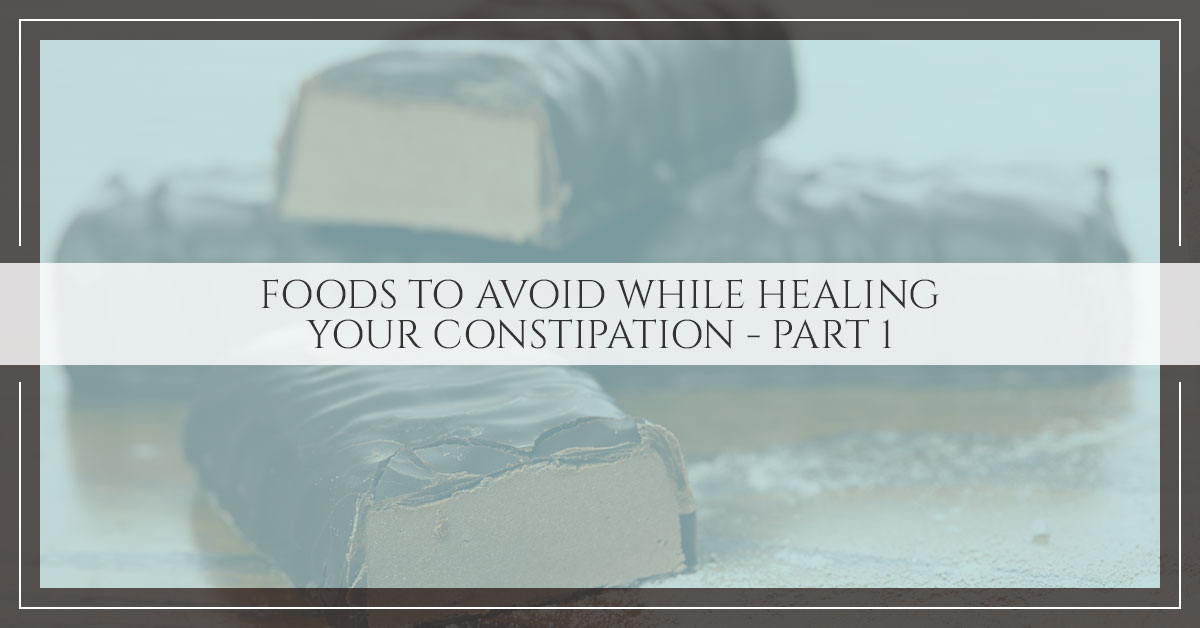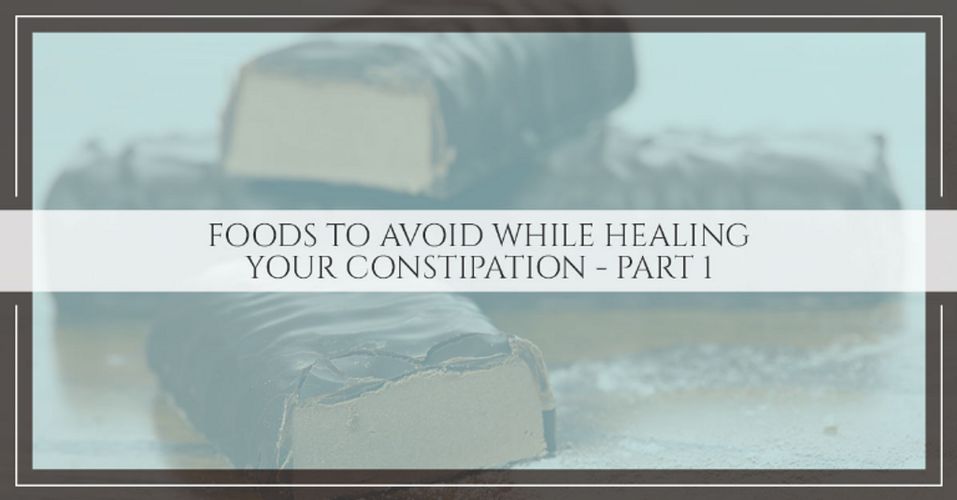When you are dealing with any digestive issue, it is a difficult and uncomfortable journey, and constipation is no exception. When you struggle with constipation, sometimes it can feel like guesswork or a stab in the dark to figure out what foods to eat and which ones not to. You probably already know that you need to drink lots of water and eat plenty of dietary fiber, but what if you’re already doing that and it isn’t enough to correct the problem? Sometimes, the answer may even feel like it’s all over the map, as a certain food may agree with you in one instance and not in another. That’s why we’ve put together this list of foods that you should consider avoiding during your journey to digestive wellness.

Because everyone’s body is different, no list of foods can universally apply to everyone. However, this is not the kind of list of “eat this, don’t eat that” that you might be thinking of. The following suggestions have proven very effective in our approach to solving and healing of all kinds of digestive issues over the years, including constipation, colitis, irritable bowel syndrome, diarrhea, and many more.
1. Avoid Processed Foods
Eat instead: Foods that your great-grandmother would recognize as food, such as cooked whole grains, vegetables, cooked beans, bone broth soups, fresh fruits, and dry roasted seeds and nuts.
Processed foods are not kind to your digestive system, as the manufacturing process has altered the arrangement of nutrients and fibers until they are very different than the ones that your body is suited to digest. Avoid the following items as much as possible:
- Pre-packaged meals
- Processed snack foods
- Junk food
- Chips
- Candy
- Chocolate bars, including so-called energy bars
- Foods that have a long list of ingredients you can’t pronounce
2. Avoid foods that lack a wide variety of micronutrients
Eat instead: Foods that contain a wide variety of micronutrients.
Micronutrients offer our bodies the basic building blocks that our cells need to operate effectively, repair damage, and multiply at the proper rate. Are you hungry all the time and constantly reaching for refined carbs? It might be because your cells aren’t getting the nutrition they’re craving, so they send out hunger signals, again and again, hoping that they’ll get what they’re looking for. The lining of your intestines is one of the key places that need to stay healthy because this is where the body absorbs the micronutrients from our foods and assimilates these nutrients into our blood in order to be transported and delivered to all the cells in the body.
The real reason to eat ANY Food is to feed the intestinal microbiome. This is the most important aspect of any digestive illness and it the most important thing to pay attention to in healing any digestive illness.
What are micronutrients?
- Vitamins
- Minerals
- Trace Minerals
- Enzymes
- Amino Acids
- Essential Fatty Acids
- Phytonutrients
- Antioxidants
- Pigments (e.g. chlorophyll)
The key to a healthy diet is to select organic quality whole foods and prepare them or cook them properly. A small percentage of the human diet can be raw foods and naturally fermented foods but the bulk of the human diet should be:
- cooked whole grains
- cooked beans
- cooked root vegetables
- cooked cruciferous vegetables
- cooked green leafy vegetables
- dry-roasted seeds and nuts
- cooked fowl, fish, and minimal red meat
3. Avoid low-quality foods
Eat instead: Choose the highest-quality foods that you can buy
In all situations, people should choose the best quality foods. The best quality foods are always clean and fresh organic quality whole foods.
Does it make a difference to your digestive system whether a food is high- or low-quality? Absolutely. Some of our patients have been unable to tolerate a certain item until they switched to the organic version, at which point their problem cleared right up.
If you’re traveling and want to conduct an interesting experiment, check out the difference between grocery stores in different parts of the country. You’ll find that the regions of the country where health problems are the most rampant are also the regions where low-quality foods are flying off the shelves. How can you tell which foods fly off the shelves? Just look at the proportion of shelf space that item gets. If there’s a huge macaroni-and-cheese section with a tiny produce department, there’s a difference in the buying habits of that whole community compared to the store with a massive produce section full of obscure, hard-to-find items (and only one row on the shelf devoted to boxes macaroni-and-cheese). High-quality food matters, and you’ll see the difference both in your own individual health and in the overall health of a population.
If you are looking for a way to solve constipation, you are not alone. While some medical professionals may just throw up their hands at the problem, deep down, you know that there are things that you can do with your diet to get your digestive system back in working order. Part of the way to do that is to avoid any foods that are triggering your constipation or taking a toll on your digestive system, making the problem worse.

4. Avoid eating foods in large volumes
Eat instead: Smaller portions at more frequent intervals
It’s very easy to fall into the habit of eating too much food at one sitting, but your digestive system will let you know that it’s unhappy in one way or another. Eating a large volume of food puts a big load on your digestive system all at once, and it simply won’t be able to operate as efficiently as it could.
Make a fist and look at your hand. That’s about the size of your stomach. Compare that to the size of the pile of food on your plate (allowing for some of the food to pack together more tightly after it’s chewed up). If it’s close, congratulations! If your fist is dwarfed by the size of the meal you’re about to eat, consider changing your habits to eating smaller portions at regular intervals. Your digestion will thank you for it.
5. Avoid eating food that you eat too fast or don’t chew thoroughly
Eat instead: Food that you chew slowly and completely, sitting down at a table
There are people who pride themselves on being able to scarf down food fast. There are other people who don’t even notice how fast they eat, but others are constantly observing their empty plate and remarking, “Wow, how’d you eat that so fast?” There are others who are always on the go, so they eat on the go—they graze on a few bites of this and that all day, eat lunch at their desk, and eat dinner in the car. Stress and hurry tie their stomach in knots as they go on at a frantic pace.
Does it matter if you chew thoroughly and eat slowly? To your digestion, it does. The act of chewing is considered to be “mechanical digestion.” In other words, you are mechanically breaking down food into smaller pieces until it becomes a liquid called chyme, at which point, you swallow, and your stomach takes it from there. Many people never get to the stage where all the food in their mouth could be considered liquid. It’s more like the texture of chunky cottage cheese when they swallow, and this makes the stomach’s job impossible.
There is also another extremely important process going on while you chew, and that’s called “chemical digestion.” Chewing triggers your mouth to release saliva, which contains enzymes that begin chemically breaking down the particles of food into their respective micronutrients. Your teeth could never break down food at the molecular level, but your saliva does. After you swallow, the hydrochloric acid in your stomach continues this chemical digestion process. But if you wolf down your food, you’re skipping the chemical digestion step that your saliva would have accomplished. So does that matter? Can’t your stomach just do the complete job on its own without the help of saliva? Well, your saliva is there for a reason. It’s like going into the carwash. You can pay more for the carwash to dispense a sudsy presoak product – or you can skip it and risk that your car will come out not completely clean at the end. Which do you want?
In other words, if you don’t chew thoroughly, you could be missing out on vital nutrients and putting an extra toll on your digestive system at the same time.
Chewing breaks down food. The more we chew, the more saliva we produce. Saliva contains salivary amylase, which breaks down complex carbohydrates. If complex carbohydrates don’t get broken down in the mouth, they don’t get broken down anywhere else. This leads to all forms of indigestion, including acid reflux, gas, bloating, cramping, constipation and diarrhea.
Chewing thoroughly helps you to slow down, but it’s also important to be intentional about mentally taking a breather during meals. Yes, you have to survive. Yes, you have a million things to do. And yes, you know you’re killing yourself with all this stress. So just stop it. Give yourself the permission to let mealtimes be a lull, a sweet retreat of calm and peace in your day.
6. Avoid eating foods that you haven’t given thanks for
Do instead: Practice gratitude
You don’t have to be religious to cultivate gratitude. Try taking a brief, quiet moment to reflect on where the food came from that you’re about to eat and be thankful for it. You can feel thankful for the existence of such a food on earth, thankful for all the people who worked in agriculture and the rest of the supply chain to get it to you, thankful for the good that this food will do your body, and thankful for the conversation and relationships with the people you’re about to share the meal with.
Will it help? How does your digestive system even know whether thankful thoughts went through your mind before eating? Don’t take my word for it. Simply experiment with yourself. Try setting aside 7 days to pause with thankfulness for everything you eat. See if anything in your digestion changes. I’m confident you’ll see a difference. Share what you find out about yourself in the comments below!
---
Contact Us For Constipation Relief And More. Don’t let your constipation or other digestive issues continue to get the better of you. Russell Mariani has helped many people on the path toward digestive wellness, and you may find help here, too. His book can be found exclusively at https://www.thecenterforfunctionalnutrition.net/. Schedule a consultation with Russell Mariani today.















